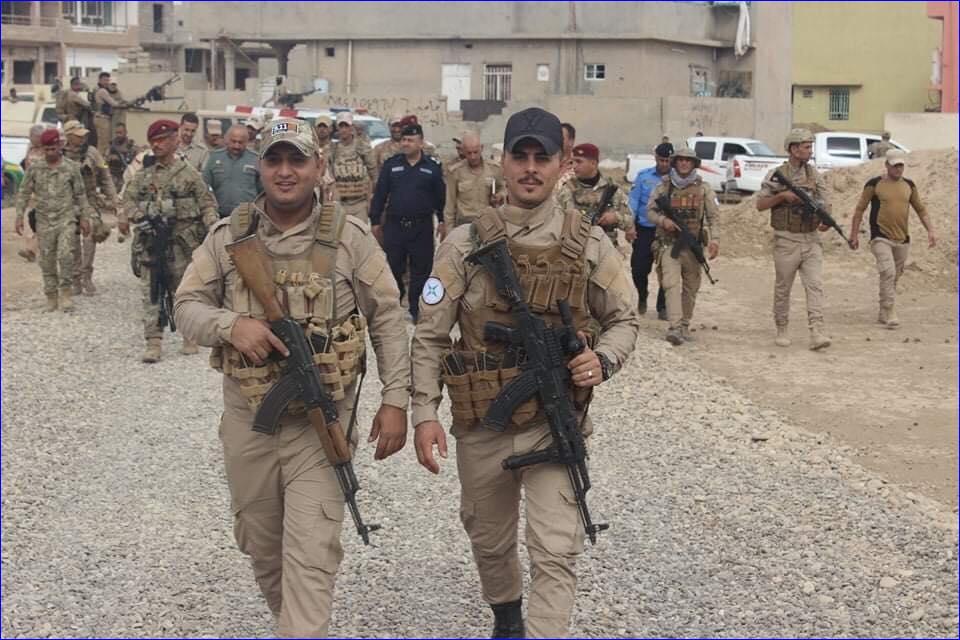


"The NPU is restored to its independent status."
In reality, what unfolded on Oct. 20 is more complex.
The NPU is an Assyrian fighting force, cobbled together in 2014 as locals volunteered to defend their towns from a surging Islamic State invasion.
The group fought alongside the Iraqi Army, Peshmerga forces, and US-led coalition forces to liberate the towns of Tesqopa, Batnaya, Bartella, and Baghdeda. Following the extremist group's ouster from Iraq in 2017, the NPU remained in place to keep those towns safe as displaced families returned home and ISIS splitter cells hurled repeated attacks.
NPU's presence made a big difference. In the years after ISIS withdrew, Assyrians returned to towns guarded by their local fighters at higher rates than anywhere else in the country, according to a 2019 testimony at the United States Commission on International Religious Freedom and a report by the Assyrian Policy Institute.
In Baghdeda, for example, 70% of the town's 35,000 Assyrians returned home. Meanwhile in non-NPU controlled areas, that number sat much lower -- Tesqopa's return rate hovered at 20% and nearby Tel Keppe saw only 7% of its population return.
At the time of ISIS, the NPU and other armed groups banded together to form the Popular Mobilization Forces, an umbrella group that shared information and coordinated attacks. It included some groups with close ties to neighboring Iran. After ISIS was territorially defeated in 2017, the PMF presence lingered.
By 2023, PMF leadership moved a regiment of the NPU (the 13th) under the control of the Iran-aligned Babylon Brigade, also known as the 50th. The NPU's 74th regiment remained independent and in control of Karamlesh
Church leaders and local citizens marched against the move and dividing of their forces. Accounts emerged of the Babylon Brigade's shakedown of Assyrians at checkpoints, reported looting of Christian artifacts at a local monastery, harassment of women, and attempts to replace local officials with those loyal to their forces.
These abuses laid the groundwork for a U.S. designation of serious human rights abuse and corruption against the brigade's founder, Rayan al-Kildani. The NPU submitted a failed petition for the 13th to be removed from Babylon Brigade's control.
"We don't want to be part of a political conflict in the Nineveh Plain," a leader of the unit told The Journal. "We're working for the local people to make the area secure, not for other people coming in."
So what changed? On Oct. 20, the PMF announced the NPU's 13th would break from the Babylon Brigade. In addition, the NPU's 74th would join under the 13th banner, merging the fractured fighting force after two years apart.
It's unclear why the move was made now, although some Assyrian community leaders speculated the decision is linked to the upcoming national elections on Nov. 11.
The NPU's reassignment set off praise by Assyrians worldwide.
"This step restores rights to the owners and confirms that the Nineveh Plain Forces exist to protect our people, not to be exploited under foreign pretexts," wrote Hikmet Kakos Mansur.
The NPU will remain a fighting force under the PMF. Although legally part of the Iraqi Armed Forces, funded by the defense ministry, and reporting to the prime minister, the PMF largely acts independently from state control and its armed groups have transformed into formidable political parties.
And though a lot has changed since the NPU formed over a decade ago, its mission is resolute: guarding Assyrian towns. Today it runs security in Baghdeda, Karamlesh, and parts of Bartella and Nimrud, a senior official told The Journal. NPU leaders are working to secure approval to defend all Assyrian towns in the Nineveh Plain.
Six hundred Assyrians actively serve in the unit. This number is capped by Baghdad's defense ministry.
The Nineveh Plain is among the most diverse regions in Iraq, including Assyrians-Chaldeans-Syriacs, Shabaks, Yazidis, Arabs, Kurds, Turkmen, and others.
The area is also strategically important, serving as a buffer between Mosul and the Kurdistan Region. A local fighting force for each ethnic and religious group creates a sensitive environment, the official said, and will not be safe until all groups have the same agenda.

or register to post a comment.